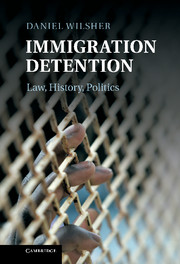Book contents
- Frontmatter
- Contents
- Acknowledgements
- Introduction and overview: free movement of persons and liberty of the person
- 1 The creation of immigration detention: from free movement to regulated borders in America and the United Kingdom
- 2 Modern immigration detention and the rise of the permanent bureaucratic enterprise
- 3 International law and immigration detention: between territorial sovereignty and emerging human rights norms
- 4 Negotiating detention within the European Union: redefining friends and enemies
- 5 Security and immigration detention: the problem of internment in peacetime
- 6 Global migration and the politics of immigration detention
- 7 Restoring the rule of law and influencing politics: placing boundaries around detention
- Bibliography
- Index
- References
5 - Security and immigration detention: the problem of internment in peacetime
Published online by Cambridge University Press: 05 November 2011
- Frontmatter
- Contents
- Acknowledgements
- Introduction and overview: free movement of persons and liberty of the person
- 1 The creation of immigration detention: from free movement to regulated borders in America and the United Kingdom
- 2 Modern immigration detention and the rise of the permanent bureaucratic enterprise
- 3 International law and immigration detention: between territorial sovereignty and emerging human rights norms
- 4 Negotiating detention within the European Union: redefining friends and enemies
- 5 Security and immigration detention: the problem of internment in peacetime
- 6 Global migration and the politics of immigration detention
- 7 Restoring the rule of law and influencing politics: placing boundaries around detention
- Bibliography
- Index
- References
Summary
The aliens power: the permanent emergency power?
As we have seen, the most commonly stated rationale for immigration detention has been an instrumental one; to ensure expulsion is successful. Not infrequently, however, ‘immigration’ powers have been used to detain foreigners to achieve non-immigration objectives. Moral panics in relation to crime have coalesced around aliens and supported the use of preventive detention without trial pending deportation. The fear of anarchists in Edwardian England through to the American Red Scares in the 1920s and the Cold War all show the same pattern of incarceration aimed at the suppression of political activity by foreigners deemed subversive by the state. Whilst this has been ostensibly linked to deportation, citizens have been left free to engage in such action without internment. In more recent years, the risk posed by international terrorism has led governments to use ‘immigration’ powers to preventively detain unwanted foreigners. Detention of foreigners has proved a flexible political tool to meet many situations beyond merely expulsion goals. Governments have been able to employ what would normally be considered ‘emergency’ powers to preventively detain without generalizing the powers to all.
In this chapter we examine the contention that lack of immigration status serves as a justification for dispensing with orthodox notions of the rule of law and due process. There is, of course, no doubt that permanent incarceration will limit the risk of aliens committing harmful or unacceptable acts. Save for in exceptional circumstances, preventive detention of citizens is either unconstitutional or politically unacceptable. In the case of migrants, by contrast, far from being exceptional, preventive detention has become quite normal. This is very clear in the growth of mandatory detention for those convicted of even relatively minor criminal offences, but goes further to include persons merely suspected of posing a threat. Most importantly, in cases involving allegedly dangerous aliens, detention periods have been especially prolonged by executive agencies and legislators. In such cases, detention can drag on for years whilst diplomatic negotiations take place between countries, with only speculative chances of successful expulsion.
- Type
- Chapter
- Information
- Immigration DetentionLaw, History, Politics, pp. 207 - 255Publisher: Cambridge University PressPrint publication year: 2011



